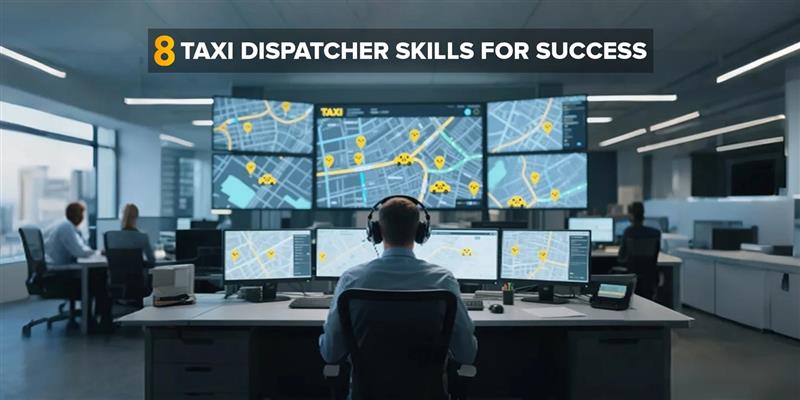Dispatchers handle live bookings, routing, and communication through apps and cloud-based platforms. They play a key role in customer service, driver support, and fleet operations.
This guide covers 8 key skills every dispatcher needs to succeed and how to improve them with the help of smart tools like taxi cab dispatch software and booking systems.
What Does a Taxi Dispatcher Actually Do?
A taxi dispatcher controls the traffic of drivers, cars, and customer requests in real time. Their main job is to link passengers with the closest driver. They do this using a taxi dispatch system or dispatching software.
Dispatchers handle real-time communication between drivers and customers.
- They assign rides and track vehicles using GPS.
- They fix problems like delays or cancellations.
- They also track the fleet and check ride statuses.
- Their goal is to make sure each booking is completed smoothly.
Most dispatchers work with cloud-based taxi management software or mobile dispatch apps. These tools help manage daily operations. Dispatchers keep the system running so passengers are picked up on time and drivers stay active.
Related Articles: Taxi Dispatch Software – The Complete Guide
Related Articles: Best iCabbi Alternative in 2025
The 8 Essential Skills for Taxi Dispatchers
1. Clear and Confident Communication
A successful taxi dispatcher must be clear when speaking or typing messages. They often manage real-time communication with drivers, passengers, and team members.
When instructions are unclear, drivers may go to the wrong pickup point or delay the ride. This leads to unhappy customers and wastes fuel.
For example, if a driver isn’t sure where to pick up a rider, the dispatcher must give quick and accurate directions. Dispatchers use headsets, radio tools, or cab dispatch software to stay connected.
To improve this skill, they can practice role-play scenarios, tone control, and daily shift briefings to boost clarity and speed.
Related Articles: 5 Common Challenges when Implementing Dispatch Software
Related Articles: WhatsApp Chatbot: Smarter Booking for Taxi Business Growth
2. Exceptional Multitasking and Prioritization
There are numerous tasks that a taxi dispatcher does. Calls, driver messages, app alerts and real-time fleet data can be handled in seconds. It is at this stage that multitasking and prioritizing on what to tackle first becomes very crucial.
As an illustration, they can acquire new bookings and cancelations and a late driver during rush hour. A competent dispatcher corresponds to dispatch dashboards, mobile applications, and booking software that can help them to remain organized.
There are alerts and ride statuses depicted in these tools. To develop this skill, dispatchers may use time-boxed tasks or simulations that replicate busy shift hours.
3. Fast and Accurate Decision-Making

Throughout the day, the taxi dispatchers take fast decisions. They divert drivers, reallocate rides and resolve disputes with clients live. The result of a slow or incorrect decision might be missed pickups, delays, or unsatisfied passengers.
As an illustration, in case a driver is caught in the traffic a dispatcher can change the booking to another vehicle that is in the vicinity. This is made quicker and more credible with the help of a cab dispatch system that is supported by GPS tracking.
Taxi management software is also smart and displays the patterns and data to make a more improved choice. One way through which dispatchers can enhance this skill is using decision trees, software analytics and real-world training on ride scenarios.
Related Articles: Building vs Buying Taxi Software: What’s the Smarter Investment
Related Articles: The Evolution of Taxi Dispatching: Manual Vs Automated Systems
4. Stress Management and Emotional Control
The taxi dispatchers are in a stressful occupation. They attend to a great number of calls, monitor drivers and address customer problems simultaneously. This pressure would lead to stress if it were not dealt with.
As an example, a dispatcher can work with an indignant customer when a driver is stuck. Remaining composed is beneficial to both parties and to keep the ride on course. The good methods consist of deep breathing, brief rest periods and taking escalation steps where necessary.
High levels of emotional control can assist dispatchers to be attentive, assist the drivers and ensure that the taxi dispatch system operates without errors.
Related Articles: How AI Can Change the Taxi Industry – Transforming Transportation
Related Articles: 5 Common Challenges when Implementing Dispatch Software
5. Technical Savviness and Software Fluency
Technology must be familiar to the modern dispatchers. They are operating dispatch dashboards, GPS tracking, and mobile applications to control bookings. Equipment such as automated scheduling and monitoring of ETA keeps the rides on time.
In an example where a customer book a ride, they check the fleet tracking, dispatcher assigns the nearest driver and within a few seconds, the system is updated. This saves on costs and enhances reliability.
The reason to develop this skill is through training. Onboarding, LMS, or practice in a software sandbox can be used to dispatchers to learn. Good technological capabilities ensure that the cab dispatch system is seamless and effective.
6. Attention to Detail and Organization
Dispatchers must stay sharp and organized at all times. A small mistake, like a wrong pickup address or missed note, can cause big problems. It may delay a ride, upset a customer, or waste driver time.
To avoid errors, dispatchers use CRM tools, dispatch notes, and automated logs. They also record calls, update driver records, and track bookings carefully. Strong organization keeps the taxi dispatch system running smoothly.
With the right habits and tools, dispatchers reduce errors, save time, and keep both drivers and passengers satisfied.
7. Strong Customer Service Orientation
Effective listening and a clear kind tone are the beginning of effective customer service. Support teams should demonstrate empathy through the comprehension of the problem of a rider or a driver and maintain calmness.
The ability to answer the problem rapidly and with courtesy builds trust. Active listening refers to giving the customer a listening opportunity and then affirming him/her on his/her problem. Support is more human with courtesy scripting such as, thank you, please wait.
Having cultural awareness and helping in the language other than one language is an added advantage which enhances the overall experience.
8. Industry Knowledge & Regulatory Awareness
To operate a legal and safe taxi dispatch service, it is important to know the local laws and fare regulations of the taxi service. The dispatchers and support teams ought to be aware of licensing, insurance requirement, and pricing in their region.
This will prevent fines and keep business running. It is also important to keep abreast with rule changes because laws may change frequently. To keep up with the news, become part of local taxi groups, read news alerts and subscribe to industry newsletters.
This creates confidence among drivers, riders and local authorities.
Bonus Skills That Make a Dispatcher Stand Out
The best taxi and school dispatchers are effective because they do not simply learn the simple skills. They are distinguished by conflict resolution, technological flexibility and leadership.
- Conflict resolution assists dispatchers to resolve customer or driver arguments amicably and peacefully without causing delays and other setbacks to the operations.
- Flexibility towards AI tools implies that it is capable of utilizing smart dispatch software, real-time route, and GPS tracking to make superior decisions in a short time.
- Leadership increases the morale of drivers. A positive work culture is achieved through a supportive dispatcher, teamwork is enhanced, and turnover is minimized.
These additional competencies enhance communication, increase the service quality, and augment any transport management system – taxi fleets to school runs.
Conclusion
Great dispatchers balance three things: tech skills, people skills, and fast thinking. They manage drivers, use dispatch software, and solve problems in real time — all while keeping rides on schedule.
When a dispatcher has the right skills, the whole system runs better. Fewer delays, happier drivers, and more satisfied customers.
Looking to improve your dispatch operations?
Need tools to support skilled dispatchers? Explore our dispatch platform and see how we help teams manage fleets smarter and faster.
FAQs
What is a dispatching skill?
- clear communication skills
- strong multitasking and prioritization
- quick and accurate decision-making
- emotional control under pressure
- confidence using dispatch and tracking software
- attention to detail and record-keeping
- customer service and conflict handling
- knowledge of transport systems and local rules




